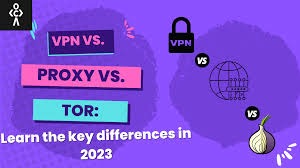Selecting the right tool for safeguarding your digital footprint has become essential because VPNs vs. Proxies vs. Tor: online privacy remains under ongoing threats in this current era. Among the three primary options for enhanced security online, you can choose between VPNs, proxies, and Tor. Determining the best option from among these tools depends on how your particular requirements shape up for 2025. Knowing the specific functions of these tools enables users to decide most effectively. Readers can understand the functionality of each shield and their security features, along with speed capabilities and appropriate use scenarios, through the guide.
VPNs: The All-Round Privacy Solution
How VPNs Work
The virtual private network (VPN) generates encrypted traffic that uses a distant server to hide your original IP address. The secure tunnel between devices and the internet provides an encrypted passage that hinders hackers, ISPs, and governmental institutions from tracking online activity.
Pros of VPNs in 2025
- Authentication benefits from AES-256 encryption, which security forces as well as financial institutions adopt for their processes.
- Establishments with trustworthy no-logs policies protect your personal data from storage.
- Users gain unrestricted access to streaming platforms, including Netflix and BBC iPlayer, alongside Hulu, by using VPN services.
- VPN connections provide improved speed when compared to Tor networks; thus, they work best for streaming and torrenting activities.
Cons of VPNs
- Cost: Free VPNs often sell user data; data-only paid options are reliable.
- Trust Issues: Some VPN providers may log user activity despite claims.
- Blocked by Some Services: Streaming platforms and governments (e.g., China) actively block VPN traffic.
Best For:
- Users who want strong privacy without sacrificing speed.
- Frequent travelers need secure access to their home content.
- Journalists and activists in censored regions.
Proxies: The Lightweight (But Less Secure) Alternative
How Proxies Work
A proxy server acts as a middleman between your device and the internet. Unlike VPNs, proxies don’t encrypt traffic—they only change your IP address. There are different types:
- HTTP Proxies: Only work for web browsing.
- SOCKS5 Proxies: Support torrenting and gaming, but are slower.
- Transparent Proxies: Often used by employers or schools to monitor traffic.
Pros of Proxies in 2025
- Faster for Specific Tasks: Since there’s no encryption, proxies can be quicker for simple web scraping or accessing geo-blocked websites.
- Easy to Use: Browser extensions make them convenient for quick IP changes.
- Cheaper (or Free): Many free proxies are available, though risky.
Cons of Proxies
- No Encryption: Your data is exposed to hackers and ISPs.
- Unreliable Privacy: Free proxies often log and sell user data.
- Limited Functionality: Won’t protect non-browser apps (like email or messaging).
Best For:
- Users who only need to change their IP (e.g., for sneaker bots or bypassing simple blocks).
- Casual browsing when encryption isn’t a priority.
Tor: Maximum Anonymity, But at a Cost
How Tor Works
The Tor (The Onion Router) network routes your traffic through multiple volunteer-run servers (nodes), encrypting it in layers (hence “onion”). This makes tracking extremely difficult.
Pros of Tor in 2025
- Near-Complete Anonymity: It’s hard for anyone (even governments) to trace your activity.
- Access to the Dark Web: The only way to reach .onion sites.
- Free & Decentralized: No single entity controls the network.
Cons of Tor
- Extremely Slow: Multiple encryption hops drastically reduce speed.
- Not Ideal for Streaming/Torrenting: Bandwidth-heavy tasks are nearly impossible.
- Some Suspicion: Using Tor can draw attention from ISPs and authorities.
Best For:
- Whistleblowers, journalists, and activists need extreme privacy.
- Users accessing censored information in oppressive regimes.
Understanding the Basics: VPNs, Proxies, and Tor
| Feature | VPN | Proxy | Tor |
| Encryption | Strong (AES-256) | None | Strong (multi-layer) |
| Speed | Fast (varies by server) | Very Fast | Very Slow |
| Anonymity | High (but logs may exist) | Low | Extremely High |
| Use Case | Privacy, streaming, torrenting | Bypassing geo-blocks | Whistleblowing, censorship evasion |
| Cost | Paid (mostly) | Free/Paid | Free |
Understanding proxies
Selecting the right tool for safeguarding your digital footprint has become essential because, with VPNs vs. proxies, you can hide your original IP address when using the internet, although they will not protect your online communications from snoopers. The main distinction between VPNs and proxies lies in their functionality because proxies redirect browsing traffic only, while VPNs protect your complete online communication, although at a slower speed. Users should avoid free proxies because numerous platforms keep track of user data, which they afterwards distribute to hawkers or cybercriminals. Proxies work well to break geo-restrictions and get restricted content quickly, yet they cannot safeguard important information such as account passwords or bank details. When compared to standard SOCKS5 proxy services, torrenting and gaming become slightly more accessible, although SOCKS5 proxies provide no encryption security features. True anonymity is the domain of proxies that cannot be achieved. IP masking functions are the main benefit of proxies, but the limited security properties make them unfit for protecting sensitive information.
Proxy vs VPN vs Tor
Through proxies, you can hide your original IP address when using the internet, although they will not protect your online communications from snoopers. The main distinction between VPNs and proxies lies in their functionality because proxies redirect browsing traffic only, while VPNs protect your complete online communication, although at a slower speed. Users should avoid free proxies because numerous platforms keep track of user data, which they afterwards distribute to hawkers or cybercriminals. Proxies work well to break geo-restrictions and get restricted content quickly, yet they cannot safeguard important information such as account passwords or bank details. When compared to standard SOCKS5 proxy services, torrenting and gaming become slightly more accessible, although SOCKS5 proxies provide no encryption security features. True anonymity is the domain of proxies that cannot be achieved. IP masking functions are the main benefit of proxies, but the limited security properties make them unfit for protecting sensitive information.

Final Comparison Table
| Feature | VPN | Proxy | Tor |
| Encryption | Strong | None | Strong |
| Speed | Fast | Very Fast | Very Slow |
| Anonymity | Medium-High | Low | Extreme |
| Bypass Geo-Blocks | Yes | Yes | Limited |
| Best For | Privacy, streaming, torrenting | Quick IP changes, scraping | Whistleblowing, dark web |
Conclusion
Your precise requirements determine which a Selecting the right tool for safeguarding your digital footprint has become essential because VPNs vs. proxies vs. Tor should be your selection in digital practices. Many users will find their perfect online security balance through VPNs due to their encryption capabilities, along with sufficient speed and geo-unblocking benefits that have gotten even better thanks to WireGuard technology. An IP address change only requires a proxy, but this method does not provide security, although it serves basic restriction bypasses. Absolute anonymity requires Tor because journalists, activists, and whistleblowers need its security features, although they must deal with slow speeds. VPN services will remain the primary decision for everyday privacy protection in 2025, while back-end programs utilizing proxy servers will keep their niche function as web scraping tools. The slow pace of Tor makes it essential for blocking censorship and ensuring untrackable internet navigation. To enhance your security, you should use multiple tools, such as Tor through a VPN, to gain extra protection. Your selection of privacy tools depends on your most important priority between speed, privacy, or anonymity; therefore, choose selectively.











